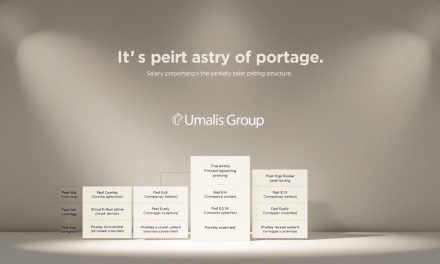Did you know that over 60,000 professionals in France now operate under a unique framework that grants them the freedom of freelancing with the security of a traditional job? This powerful hybrid model is reshaping how experts work.
We welcome you to this guide on the portage salarial status. It is designed for consultants, IT specialists, and other skilled experts. This arrangement lets you run your own professional activité without the heavy burden of starting your own company.
This framework creates a three-way partnership. It connects you, the salarié porté, with an entreprise portage salarial and your client’s business. You gain the autonomy to find projects and manage your travail. At the same time, you enjoy the protections of a formal employment contract.
Our goal is to provide clear, structured information. We will explain the legal requirements and how you get paid. This knowledge will help you make an informed choice about your career path.
Table of Contents
Key Takeaways
- A unique employment model blends freelancing freedom with job security.
- It is an ideal solution for consultants and experts seeking stability.
- The system involves three key parties: the professional, an umbrella company, and the client.
- You maintain control over your projects and client relationships.
- It provides access to social protections without the hassle of creating a business.
- Understanding the structure is the first step to leveraging its benefits.
Understanding Portage Salarial: Definition and Benefits
Before becoming a legally recognized framework, portage salarial existed as informal arrangements among French consultants. These early practices laid the foundation for today’s structured system.
Historical Background and Legal Framework
The system gained official status on June 25, 2008. The French National Assembly voted to include it in the Code du travail. This legislation defined the tripartite relationship clearly.
Article L1251-64 establishes the formal structure. It connects the professional, the entreprise portage, and client companies. This created legal protections for all parties involved.
A major milestone occurred on March 22, 2017. The sector adopted a comprehensive convention collective. This agreement standardized practices across the industry.
Overview of Advantages for Independent Professionals
This framework offers significant benefits for skilled experts. You maintain independence while gaining employee protections. The system provides stability without sacrificing flexibility.
Key advantages include:
- Access to sécurité sociale and unemployment insurance
- Professional liability coverage
- Retirement contribution management
- Simplified administrative processes
This arrangement particularly benefits consultants and IT specialists. It supports professionals who operate in business-to-business contexts. The model matches their expertise with appropriate employment status.
Overview of Statut du Portage Salarial for Independent Professionals
This innovative model redefines how experts can operate by blending the best aspects of freelancing and traditional employment. It creates a pathway where you maintain control over your professional destiny while accessing the security typically reserved for employees.
Key Features of the Statut du Portage Salarial
The fundamental principle is your complete autonomy. You independently search for clients and negotiate mission terms directly. This includes setting rates, defining scope, and determining duration. The umbrella company does not provide work but facilitates your independent activité.
Despite having an employment contract as a salarié porté, you operate without subordination to either the client or the portage company. This preserves your professional independence throughout each engagement.
The tripartite contractual arrangement is central to this framework. You negotiate directly with the entreprise cliente, while the portage company formalizes these terms through a commercial contract. You then receive a contrat de travail establishing your employee status and compensation structure.
This structure allows you to focus entirely on your core expertise and mission delivery. The entreprise de portage salarial handles administrative burdens like invoicing, payment collection, salary disbursement, and social contributions. Understanding these reglementations du portage salarial en France ensures you operate within the legal framework.
This arrangement particularly benefits established professionals with existing expertise and client relationships. It offers entrepreneurial freedom with employment security, creating an ideal balance for those seeking stability without business management complexities.
The Tripartite Model: Roles and Responsibilities
Three distinct entities collaborate in this arrangement, each bringing essential functions to the table. Understanding these roles helps ensure smooth operations and legal compliance.
The Role of the Salarié Porté
As the salarié porté, your primary responsibility is business development. You actively search for clients, negotiate mission terms, and deliver professional services.
You maintain complete autonomy in choosing projects and setting rates. This independence exists despite your employee status. You organize your work methods without supervision from either party.
Your success depends on maintaining strong client relationships. The entreprise portage salarial supports your activity but doesn’t guarantee work.
Responsibilities of the Entreprise Portage Salarial
The entreprise portage handles administrative and legal tasks. They issue invoices to clients and collect payments according to the agreed contrat.
Key functions include:
- Processing salary with proper deductions
- Managing social contributions and taxes
- Providing professional liability insurance
- Maintaining transparent activity accounts
The société ensures all operations comply with French labor regulations. They provide monthly statements showing revenue, fees, and net remuneration.
The client company defines mission requirements and provides working conditions. They respect your professional independence throughout each project.
Legal Framework and Contractual Obligations
Understanding the legal parameters governing your employment contracts is essential for operating confidently within the portage salarial framework. The Code du travail establishes precise rules that protect your rights while maintaining the system’s integrity.
Mandatory Contract Elements for CDD and CDI
French labor law distinguishes between two primary contrat travail types in this arrangement. For fixed-term engagements (CDD), the contrat must clearly state « contrat de travail en portage salarial à durée déterminée. »
According to Article L. 1254-16, this document must reach you within two business days after signing. It should detail the client company, service description, pricing, and mission durée.
For permanent contracts (CDI), similar requirements apply with the appropriate designation. Your ongoing relationship with the entreprise de portage is documented separately from individual client contrat commercial agreements.
Regulatory Limits and Mission Duration
The Code du travail imposes important restrictions on when companies can engage a salarié porté. Article L. 1254-3 specifies this arrangement is only for occasional tasks outside normal business activities.
Companies may use this framework for specialized expertise they lack internally. However, the mission must have a fixed-term objective with a maximum durée of 36 months with any single client.
These protections ensure your travail remains project-based rather than disguised permanent employment. Understanding these obligations helps you verify that your contrat complies with all legal requirements.
Eligibility and Required Expertise for Salarié Porté
To qualify as a salarié porté, French law establishes specific professional criteria that ensure this status remains reserved for true experts. These requirements protect the integrity of the system while guaranteeing that salariés portés possess the necessary skills for independent success.
Qualification and Professional Experience Criteria
The Code du travail outlines three fundamental conditions that every salarié porté doit meet. You must demonstrate recognized expertise, formal qualification or equivalent experience, and complete professional autonomy.
According to Article L. 1254-2, the porté doit possess capabilities that allow independent client acquisition and service negotiation. This distinguishes true professionals from traditional employees.
« The independent worker must demonstrate expertise, qualification, and autonomy that allow them to search for clients themselves and agree with them on the conditions of execution of their service and its price. »
The convention collective specifies exact qualification thresholds. You can meet these through education or professional experience.
| Qualification Pathway | Minimum Requirement | Equivalent Examples |
|---|---|---|
| Formal Education | Level 5 (Bac +2) | BTS, DUT, or equivalent |
| Professional Experience | 3+ years in sector | Proven track record in your activité |
This framework typically applies to technicians, supervisors, and executives. Your specialized knowledge should enable independent project analysis and execution.
If you have substantial experience in consulting, IT, or project management, you likely meet these criteria. The system recognizes both academic achievement and practical expertise.
Autonomy and Client Acquisition in Portage Salarial

Unlike conventional employment where assignments are provided, this system empowers you to actively seek out and negotiate your own projects. This fundamental distinction shapes your entire professional experience.
Establishing Client Relationships Independently
Your autonomy encompasses three essential dimensions that define your entrepreneurial role. Each aspect contributes to your professional independence.
The entreprise portage serves as your administrative platform rather than a traditional employer. You maintain complete responsibility for identifying opportunities and securing mission agreements.
| Dimension of Autonomy | Your Control | Practical Application |
|---|---|---|
| Commercial Independence | Choosing clients and sectors | Targeting companies that match your expertise |
| Negotiation Freedom | Setting rates and service conditions | Defining project scope and pricing structure |
| Operational Flexibility | Organizing schedule and methods | Balancing work periods and rest times |
« The salarié must be able to decide independently on the organization of their schedule for the completion of their services and distribute their tasks by organizing their work and rest times. »
Successful professionals leverage their networks and industry presence to develop their activité. This requires confidence in articulating your value proposition to potential clients.
Your income directly reflects your commercial effectiveness and expertise value. While this creates variability, it offers unlimited earning potential as you build your reputation.
Rémunération and Salary Structures in Portage Salarial
Your compensation as a salarié porté is structured to ensure financial security while rewarding your commercial efforts. French law establishes clear minimums to protect your income.
Minimum Wage Standards and Calculation Methods
The Code du travail sets a baseline. Your gross salaire must be at least 75% of the monthly sécurité sociale ceiling.
This amounts to €2,898 per mois for full-time work in 2024. The industry convention collective often provides even better terms.
It creates a tiered system based on your experience:
| Consultant Level | Minimum Salary (% of ceiling) | Seniority Requirement |
|---|---|---|
| Junior | 70% | Less than 3 years |
| Senior | 75% | 3+ years |
| Forfait Jours | 85% | Any |
« …a minimum remuneration for the benefit of the salarié porté… »
Understanding the Indemnity of Apport d’Affaires
Your total pay includes several parts. The base salaire comes from client fees after charges.
A key component is the apport affaires indemnity. This 5% bonus recognizes your work in finding clients.
It is paid for each contract you secure. This amount is deducted from your activity compte.
CDD contracts include a 10% precarity premium. CDI arrangements set aside a 10% reserve for income gaps.
Understanding this helps you forecast your net income accurately.
Managing Administrative Procedures and the Activity Account
Transparency in financial management is a cornerstone of the portage salarial framework. Your dedicated activity compte provides a clear window into all transactions.
This system ensures you maintain full visibility over your earnings. The entreprise portage handles the complex administrative gestion on your behalf.
Breakdown of Administrative Fees and Deductions
The frais de gestion represent the société‘s fee for comprehensive support. This covers contract preparation, invoicing, and payroll processing.
Typically ranging from 5% to 10% of your billed amount, these frais provide valuable administrative services. You also benefit from professional liability insurance and training access.
Your legitimate frais professionnels can be reimbursed through this system. Expenses like travel or equipment directly related to missions reduce your taxable base.
Proper documentation following the société‘s policy is required for reimbursement. This improves your net compensation while maintaining compliance.
How the Activity Account is Managed
Each mois, you receive a detailed statement for your activity compte. This shows client payments, deductions, and your final calcul de la remuneration.
The provision account creates a financial safety net. It’s funded by surplus amounts after mandatory deductions.
Specific reserves include precarity indemnities for CDD contracts. CDI arrangements accumulate a 10% mission salary reserve.
This transparent accounting gestion builds trust in the portage arrangement. You can verify all calculations align with legal requirements and contractual agreements.
Financial Guarantees and Risk Mitigation Strategies
Your financial security is a top priority within this professional framework. The system includes robust protections that safeguard your earnings and social benefits.
French legislation mandates specific safety measures for all participating organizations. These ensure your compensation remains protected under various circumstances.
Calculating Guarantee Financial Requirements
The garantie financière represents a crucial safety net for salariés portés. According to Article L. 1254-26, this protection covers your salary and social contributions.
The calculation follows a precise formula. It must equal at least 10% of the company’s previous year payroll.
There’s also an absolute minimum requirement. For 2024, this floor is set at €92,736 based on social security ceilings.
Only authorized financial institutions can provide this guarantee. This includes banks, insurance companies, and mutual guarantee societies.
You should always verify your chosen entreprise maintains current coverage. Reputable organizations like ITG demonstrate exceptional security with guarantees exceeding €9 million.
This mechanism differentiates legitimate société operations from unreliable intermediaries. Understanding these protections allows you to work with complete confidence in the system’s financial integrity.
Operational Guidelines for Portage Salarial Missions

The legal boundaries defining your consulting missions ensure both your professional status and client compliance. We guide you through the operational parameters that maintain the integrity of this framework.
Determining Mission Duration and Scope
French legislation establishes clear limits for your engagements. According to Article L. 1254-3, client companies can only use a salarié porté for specific circumstances.
« The client company can only use a salarié porté for the execution of an occasional task not part of its normal and permanent activity, or for a specific service requiring expertise it does not possess. »
Each mission must have a fixed-term objective. The maximum durée with any single entreprise cliente cannot exceed 36 months.
For fixed-term contracts (CDD), the limit is stricter at 18 months. This ensures your work remains project-based rather than permanent employment.
Criteria for Task-Based Consultancies
Your prestation should address occasional needs or specialized expertise gaps. This protects both your consultant status and traditional employees’ positions.
In some cas, ongoing advisory relationships may extend toward the maximum durée. The work must remain genuinely consultative rather than operational.
Prohibited uses include replacing striking workers or filling regular operational roles. Understanding these guidelines helps you evaluate appropriate missions for this framework.
Sector-Specific Considerations and Exclusions
Certain professional fields operate under regulations that make them incompatible with the portage salarial model. Understanding these boundaries helps you determine if your expertise fits within this framework.
The code du travail establishes clear prohibitions rather than approved sector lists. This approach maintains flexibility while protecting specific industries.
Restricted Sectors and Prohibited Activities
Article L. 1254-5 of the code explicitly bans personal service activité. This includes childcare, elderly assistance, and domestic household tasks.
Regulated professions face additional constraints. Lawyers, architects, and medical professionals cannot practice core prestations through this arrangement.
| Category | Prohibited Activities | Permitted Exceptions |
|---|---|---|
| Personal Services | Childcare, home care, domestic tasks | None – complete prohibition |
| Regulated Professions | Core licensed activities (legal, medical) | Training, consulting outside regulated scope |
| General Business | No general restrictions | Virtually all consulting and expertise services |
Violating these rules carries significant penalties. Both the portage company and client face fines up to €7,500 for repeated offenses.
This regulatory clarity ensures the framework serves its intended purpose. It supports knowledge-based consulting while respecting sector-specific requirements.
Comparison of Portage Salarial with Traditional Freelancing
Administrative responsibilities create one of the most significant differences between employment models. This comparison helps you evaluate which approach aligns with your professional priorities.
Advantages in Social Protection and Benefits
As a salarié porté, you enjoy comprehensive sécurité sociale coverage. This includes health insurance, retirement contributions, and unemployment benefits.
Traditional freelancers must secure these protections independently. They often face less comprehensive systems with variable coverage.
You benefit from professional liability insurance and paid leave rights. These employee-level protections provide significant security for your travail.
Differences in Administrative Responsibilities
The administrative contrast is dramatic. Traditional freelancing requires you to manage business registration, invoicing, and tax declarations.
In the portage model, the société handles 100% of these procedures. This comprehensive gestion frees you to focus on professional work.
Financial structures also differ significantly. Salariés receive regular net salary after automatic deductions.
Freelancers receive gross payments and must reserve funds for obligations. The portage salarial approach provides more predictable cash flow.
This framework typically delivers approximately 50% of client fees as net salary. While freelancers might retain higher percentages, they lack equivalent administrative support.
The startup timeline favors portage arrangements. You can begin working within 24-48 hours versus weeks for business registration.
The Role of Portage Salarial Companies in Facilitating Work
Beyond basic administrative processing, premium providers offer comprehensive development programs for consultants. Your chosen entreprise portage salarial becomes a long-term professional partner supporting your growth.
When selecting a société de portage, evaluate comprehensive value rather than just comparing frais de gestion percentages. Financial stability and industry reputation matter significantly.
Choosing the Right Portage Company
Look for established companies with strong financial guarantees above minimum requirements. Transparent fee structures and responsive communication are essential indicators of quality service.
The best entreprise portage provides practical digital tools for expense management and real-time account visibility. This efficient gestion system saves you valuable time.
| Service Level | Basic Provider | Premium Partner |
|---|---|---|
| Financial Guarantee | Minimum legal requirement | Significantly above minimum |
| Consultant Support | Standard administrative processing | Dedicated account management |
| Training Access | Limited or additional cost | Comprehensive included programs |
Value-Added Services and Professional Accompaniment
Premium companies offer practical formation in commercial techniques and rate negotiation. They provide legal guidance and networking opportunities through consultant communities.
This professional accompaniment helps salariés portés develop sustainable consulting practices. The right partnership enables you to focus on delivering excellent client work.
Future Trends and Emerging Developments in Portage Salarial
The professional landscape for independent experts continues evolving rapidly, with new opportunities emerging for those seeking both flexibility and security. This framework adapts to meet changing market needs while maintaining its core benefits.
Impact of Regulatory Changes on the Industry
Recent regulatory developments have strengthened the framework significantly. The 2017 convention collective established comprehensive standards for salariés portés.
Amendment n°12 in December 2022 updated compensation provisions to reflect current economic realities. These changes ensure fair remuneration while maintaining the system’s viability.
Companies must now declare their portage salarial activity to authorities and obtain financial guarantees. This enhances protection for all parties involved in the travail relationship.
Evolving Market Demands and Consultant Expectations
Entreprises clientes increasingly prefer flexible expertise engagement over permanent hiring. This creates expanding opportunities for specialists in digital transformation and sustainability consulting.
We anticipate portage companies will enhance their service offerings beyond basic administration. Expect more sophisticated training programs and improved digital platforms for activité management.
The integration with remote work and international projects positions this status as increasingly relevant. Professionals at various career stages can participate in the evolving world of travail while maintaining social protections.
This mature framework offers a secure pathway that reflects your contributions to the economy and société. The future looks promising for those choosing this professional activité.
Conclusion
As we conclude this exploration, you can confidently assess whether this professional pathway aligns with your expertise and aspirations. The portage salarial framework offers a unique blend of entrepreneurial freedom and employment security that supports sustainable career growth.
You now understand how this legally robust system operates through its tripartite structure. As a salarié porté, you maintain control over your professional activité while benefiting from comprehensive administrative support.
The eligibility criteria, compensation structures, and operational parameters we’ve detailed provide a clear roadmap. This knowledge empowers you to make informed decisions about your professional travail and future direction.
Remember that success in this arrangement requires balancing independence with responsibility. Your active role in client development and relationship management is essential for thriving in this model.
Choosing the right entreprise portage salarial partner becomes crucial for your long-term success. This strategic career choice allows you to leverage your skills while maintaining vital social protections.
Ultimately, this framework represents more than just an administrative solution—it’s a pathway to professional fulfillment that respects both your autonomy and your need for security.
FAQ
What is the main difference between portage salarial and being a traditional freelancer?
The primary distinction lies in your employment status. In portage salarial, you become a formal employee of the portage company, which grants you full employee benefits under the French labor code, including social security coverage and paid leave. As a traditional freelancer, you operate as a sole proprietor, managing all administrative and tax responsibilities yourself without the safety net of employee status.
Who is responsible for finding clients and projects?
You, the salarié porté, are entirely responsible for acquiring your own clients and negotiating the terms of your commercial contracts. This autonomy is a cornerstone of the model. The portage company then formalizes this relationship with a work contract and handles all subsequent invoicing and payment collection from the client company.
How is my salary calculated and what are the typical fees?
Your salary is calculated from the revenue generated by your mission, minus the portage company’s management fee and social security contributions. The management fee is a pre-agreed percentage of your turnover. The remaining amount is then subject to standard employee deductions, resulting in your net salary. You receive a detailed breakdown with each payment.
Are there any sectors or activities where portage salarial is not permitted?
Yes, certain sectors are restricted. Portage salarial is generally not allowed for activities that require a specific professional status, such as legal professions (lawyers, notaries) or regulated health professions (doctors, pharmacists). It is also prohibited for temporary work assignments, which fall under a different legal framework.
What type of work contract will I have, and is there a limit to mission duration?
You will typically sign a fixed-term contract (CDD) aligned with your specific mission’s duration. There are regulatory limits; for instance, the maximum duration of a CDD in portage salarial, including renewals, is generally 36 months. Some portage companies may also offer permanent contracts (CDI) for consultants with continuous project pipelines.
What is the "indemnity of apport d’affaires" (client acquisition fee)?
This is a specific financial advantage in portage salarial. It is a fee, negotiated with your portage company, that compensates you for the business you bring in. This indemnity is separate from your salary and is intended to recognize your entrepreneurial role in securing the client and the commercial contract.
How do I choose the right portage salarial company for my needs?
Look for a company with a strong reputation, transparent fee structure, and robust financial guarantees as required by law. Evaluate the quality of their support services, such as assistance with contract review, access to training, and the responsiveness of their account management. The best fit will understand your sector and provide genuine professional accompaniment.





